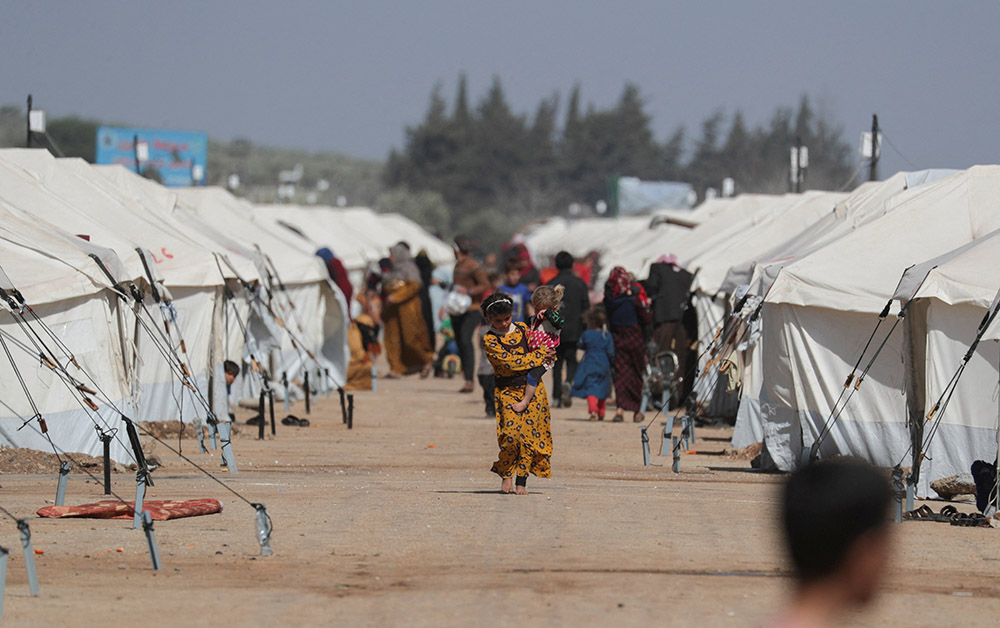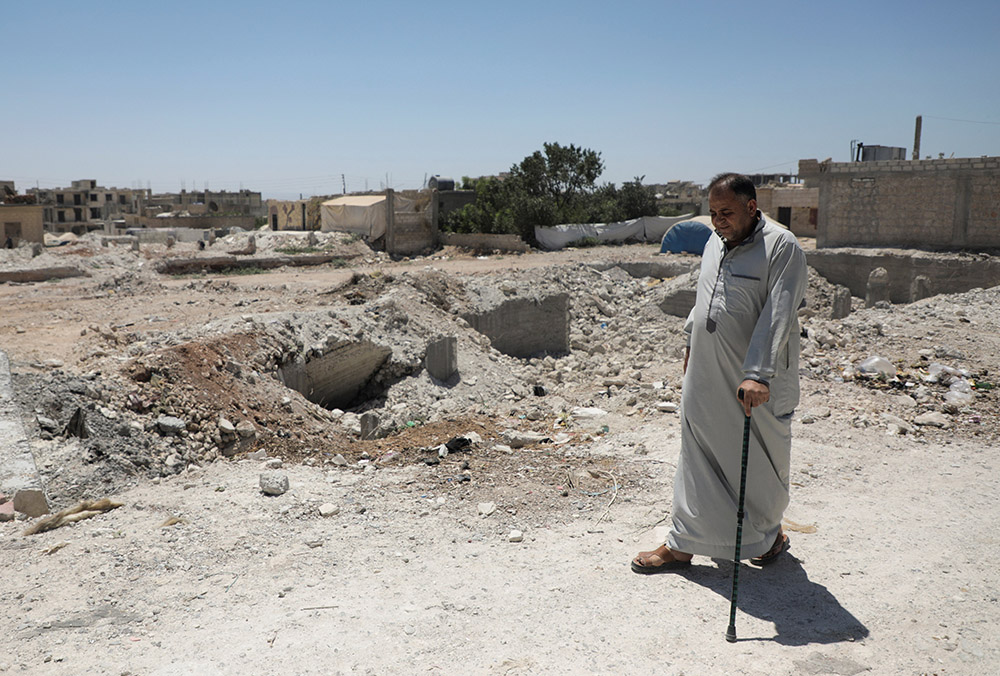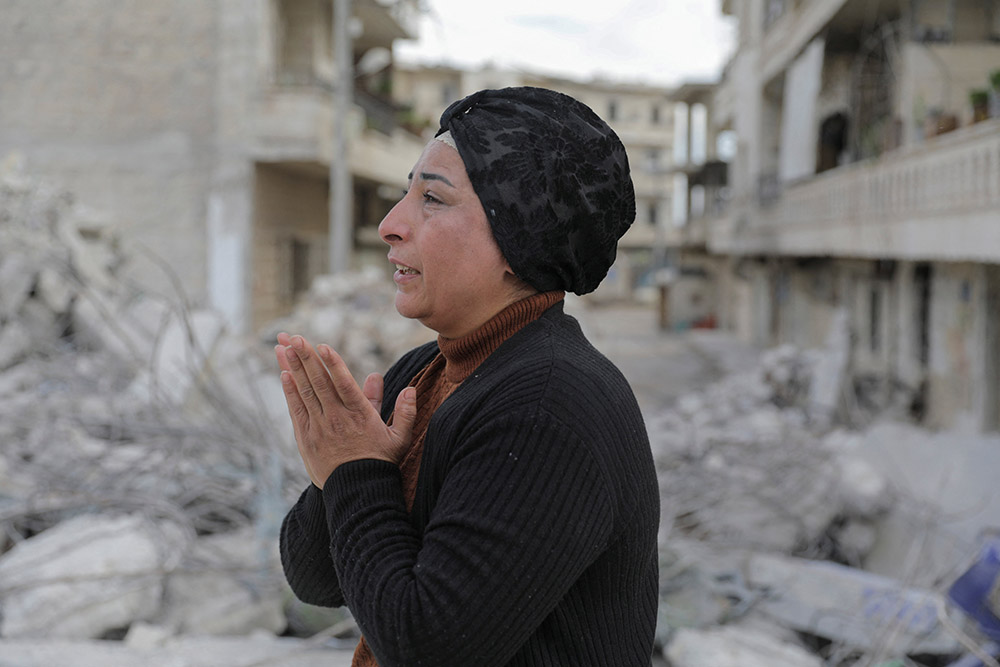
By Dale Gavlak
AMMAN, Jordan (OSV News) — Six months after the devastating earthquake that struck Turkey and Syria, Catholic aid organizations are expressing special concern and providing help particularly for the residents of northwestern Syria who they say face greater isolation from international assistance.
Twelve years of civil war have left 5.4 million Syrians as refugees, 6.8 million were internally displaced and 4.3 million are sheltering in the predominantly rebel-held region from various parts of the country in urgent need of humanitarian assistance. The earthquakes exacerbated an already dire economic recession, fuel shortages, prolonged drought and health crises such as a cholera outbreak, putting even more pressure on public systems in the area.
Thomas Weiss of Malteser International told OSV News that these people “depend totally on international support.” “Humanitarian access to Syria must be safe, consistent and especially protected from politicization,” he urged. Weiss travels regularly to northwest Syria to meet with beneficiaries and the several local nongovernment organizations with whom Malteser International partners.
“We have a protracted situation that gone on for many years now in northwest Syria, and there is a risk of abandoning it and the many millions of people there in urgent need of humanitarian support and this is of extreme great concern,” Weiss, who heads the Middle East department for the international humanitarian aid organization of the Catholic Order of Malta, told OSV News.
In Syria, there were no earthmovers or specialized equipment as in Turkey to help recover people from collapsed concrete structures flattened like pancakes in the February tremblers. The United Nations reports that the quakes left 6,000 people dead and 12,000 injured in Syria, but local officials say the exact number is likely higher. Many families are still homeless, having nowhere to live permanently. In Turkey, the earthquakes left 50,000 dead, more than 100,000 injured and nearly 300,000 buildings destroyed.

Father Tony O’Riordan of the Jesuit Refugee Service serving in the northern city of Aleppo warned that Syrians are “starving,” saying nine in every 10 people in Syria need assistance. “It’s six months on and more people are in deeper need of food assistance. We have an explosion of people in need and the international donors are underfunding the response plan,” Father O’Riordan told the Cork-based Irish Examiner.
“In Aleppo, we repaired 44 houses and buildings, and we continue to distribute food, medical kits and basic necessities. The situation is still very bad,” Andrea Avveduto, communications chief for Pro Terra Sancta, told OSV News. “We started to pay rent for the people because it is very difficult as many have no work. This must be done before any rebuilding can start on their damaged houses,” Avveduto said.
The association, based in Jerusalem and Milan, supports the Franciscan Custody of the Holy Land. In Syria’s north, it aids ministry in Aleppo and the work of two Franciscan friars in the Christian towns of Yacoubieh and Knayeh of Idlib province, which Islamist groups took over. There, the challenges post-earthquake are even greater.
Almost 80% of Knayeh’s homes were destroyed, according to the organization. The village of Jdaide also was severely damaged, but the greatest damage occurred in Yacoubieh, starting from the convent and in the church, which collapsed entirely. In Knayeh, the church has been partly destroyed and the old school is unusable.
“The situation is much more difficult,” Avveduto said. “Many Christians from these towns were forced to enter the camps for the displaced for the first time since the beginning of the war. It’s a little bit dangerous for Christians to be in the camps, where the majority of the people are Muslim,” Avveduto explained, referencing that in some cases there are Islamic militants or sympathizers present in the camps. “But because a lot of houses have been destroyed, this was the only solution for them.”
“In Knayeh and Yacoubieh, we continue to provide food for the people. We are collecting funds to try to repair damaged houses, the church and the convent. A big problem is that most of the houses should be torn down and reconstructed. But in many cases, this is not possible,” Avveduto said.
International sanctions placed on Syria have made it difficult to bring in materials needed for rebuilding homes, posing yet another challenge. While some people also are being housed in emergency centers run by the Franciscans, the one in Knayeh, Avveduto explained, “cannot host many people, and so they were forced to go to the camp for the displaced.”

Avveduto said the plan is for more houses to be repaired or rebuilt so people can return home, but international funding is badly needed. “It’s an emergency, so we try to do our best to aid the people. It seems the Syrian people have once again been forgotten. We want to do all the best to help them.”
Weiss said Malteser International has intensified its efforts to aid those “most vulnerable and deeply affected persons since the earthquakes” with the help of German donors.
The organization, working with partners, supports six hospitals, a maternity clinic with a children’s hospital, and eight primary health care units in the Idlib and northern Aleppo regions. A new makeshift hospital opened in the town of Afrin in July as part of a community project, providing medical care to some 150,000 people in need in the region and serving as the main referral hospital in the district. In collaboration with the Independent Doctors Association, Malteser International also sent out five mobile medical units to the earthquake-affected areas in Afrin, Azaz and Harim.
Also being provided are clean water and sanitation services in some of the camps for the internally displaced and trying to improve the prevention of cholera and other communicable diseases. Training and modest income generating projects based on agricultural activities are offered.
Many adults and children remain deeply traumatized from the consequences of the devastating earthquake. “To support the children’s mental health, setting up child-friendly and safe places where they can play and escape for a moment from everyday life in the camps is an important measure,” Weiss said. Non-food items, like tents, as well as food also are provided to support those in distress.
“The need for humanitarian aid was already immense before the earthquake, but with this further disaster it multiplied exponentially,” Weiss said. Many Syrians express anxiety for what the future holds for them. “This is heartbreaking, this is worrisome.”
But he added: “we will not leave the people in northwestern Syria alone and will stand by them,” a sentiment shared by all the Catholic relief groups.
